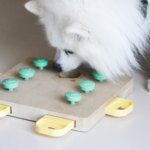Introduction
Ensuring your canine companion receives a well-rounded and nutritious diet is a fundamental aspect of responsible pet ownership. A healthy dog diet not only contributes to their physical well-being but also enhances their overall quality of life. In this comprehensive guide, we will explore the key components of maintaining a balanced bowl for your furry friend, providing insights, addressing challenges, and offering practical solutions for optimal canine nutrition.
Portion Control and Weight Management
Maintaining a healthy weight is crucial for a dog’s overall well-being, impacting their longevity and quality of life. Portion control plays a pivotal role in weight management, but it’s an aspect that dog owners often underestimate or overlook.
One common issue related to portion control is the lack of awareness about the appropriate serving sizes for different breeds and sizes of dogs. Pet owners may inadvertently overfeed their furry companions, leading to weight gain and associated health problems. This challenge can be addressed through education, as pet owners need to understand the specific dietary needs of their dogs and how to measure portions accurately.
Practical solutions include consulting with veterinarians or canine nutritionists to determine the ideal portion sizes based on the dog’s breed, age, activity level, and overall health. Additionally, using measuring cups to dispense food rather than estimating can help avoid overfeeding.
Another challenge is the tendency to equate food with love, leading to the temptation to offer treats excessively. Treats, while a delightful way to bond with your dog, can contribute significantly to their daily calorie intake. To address this, pet owners should be mindful of treat frequency and choose healthy, low-calorie options.
Regular exercise is a vital component of weight management. Dogs need physical activity to burn calories and maintain a healthy weight. Combining portion control with a consistent exercise routine is a holistic approach to weight management.
Choosing Quality Dog Food
Selecting the right dog food is a crucial aspect of responsible pet ownership, influencing your furry friend’s health, energy levels, and overall vitality. However, many dog owners face challenges when it comes to making informed choices about their canine companion’s diet.
One common issue is the overwhelming variety of dog food options available on the market, ranging from kibble and wet food to raw and homemade diets. This abundance can lead to confusion, making it difficult for pet owners to discern which option aligns best with their dog’s nutritional needs. To address this challenge, it’s essential to consult with veterinarians or canine nutrition experts who can provide personalized recommendations based on factors like the dog’s breed, age, and health condition.
Another potential pitfall is the presence of misleading marketing tactics by pet food brands. Claims such as “all-natural” or “grain-free” can be enticing, but they don’t always guarantee a well-balanced and nutritious diet for your dog. Pet owners should focus on the ingredient list, ensuring that the primary components are high-quality protein sources, supplemented by essential vitamins and minerals.
Ensuring proper portion control is another challenge related to dog food. Overfeeding or underfeeding can have adverse effects on your dog’s health. Pet owners should follow the recommended serving sizes provided by the dog food manufacturer and adjust portions based on the dog’s age, weight, and activity level.
Homemade Diets and Dietary Supplements
As pet owners increasingly seek personalized and natural approaches to their dog’s nutrition, homemade diets and dietary supplements have gained popularity. While these options offer flexibility and control over ingredients, there are essential considerations and challenges that dog owners should be aware of.
Homemade diets can be tailored to meet a dog’s specific dietary requirements, providing a variety of proteins, vegetables, and grains. However, a common challenge is achieving a balanced and complete nutritional profile. Dogs need a mix of proteins, fats, vitamins, and minerals in specific proportions. Crafting a homemade diet that meets these requirements can be complex, and pet owners should consult with veterinarians or canine nutrition specialists to develop a well-rounded meal plan.
Another challenge is the potential lack of essential nutrients in homemade diets, which may necessitate the use of dietary supplements. While supplements can address specific nutritional gaps, it’s crucial not to over-rely on them. Excessive use or inappropriate supplementation can lead to imbalances and adverse health effects. Pet owners should choose supplements carefully, focusing on those recommended by professionals and avoiding unnecessary additives.
To overcome these challenges, pet owners can work closely with veterinarians to formulate a homemade diet that aligns with their dog’s nutritional needs. Including a variety of proteins, vegetables, and grains can enhance the diet’s nutritional diversity. Additionally, when incorporating supplements, it’s essential to follow professional guidance, ensuring that they complement rather than replace essential nutrients in the dog’s diet.
Food Allergies and Sensitivities
Understanding and addressing food allergies and sensitivities in dogs is crucial for maintaining their overall health and well-being. While dogs are known for their love of food, some may develop adverse reactions to certain ingredients, leading to allergies or sensitivities.
Identifying food allergies in dogs can be challenging as symptoms vary widely. Common signs include itching, gastrointestinal upset, ear infections, and even behavioral changes. However, these symptoms can overlap with other health issues, making it essential for pet owners to consult with veterinarians for a proper diagnosis.
One potential challenge is the misconception that grains are the primary culprits for food allergies in dogs. While grains can cause sensitivities in some cases, proteins like beef, chicken, and dairy are frequent allergens. Addressing food allergies involves conducting elimination diets under veterinary guidance to pinpoint the specific ingredient triggering the reaction.
Choosing appropriate commercial dog food or preparing homemade meals tailored to a dog’s needs is a practical solution for managing food allergies. Specialized hypoallergenic dog food formulations are available, featuring limited ingredient lists to minimize the risk of triggering allergies. Homemade diets, carefully crafted with consultation from veterinarians or canine nutrition experts, can provide control over ingredients and minimize potential allergens.
Regular Veterinary Check-ups and Monitoring
Ensuring the well-being of our canine companions involves more than just providing a balanced diet and regular exercise. Regular veterinary check-ups play a pivotal role in monitoring a dog’s health and addressing their unique nutritional needs.
One potential challenge in this aspect is the misconception that veterinary visits are only necessary when a dog is visibly unwell. In reality, preventive care through routine check-ups is essential for early detection of health issues and effective management. Dogs, like humans, benefit from preventive medicine, where veterinarians can assess their overall health, identify potential concerns, and provide guidance on nutrition tailored to their specific needs.
During veterinary check-ups, potential nutritional challenges can be identified, such as weight management issues, nutrient deficiencies, or allergies. Veterinarians can offer personalized advice on selecting the right diet, adjusting portions, or incorporating supplements when necessary. Regular check-ups also allow for the timely detection of dental problems, another aspect of canine health that directly influences their ability to eat and digest food properly.
Pet owners can actively contribute to the success of veterinary check-ups by maintaining a detailed record of their dog’s diet, behavior, and any observed changes in health. Open communication with the veterinarian about the dog’s lifestyle, exercise routine, and specific dietary habits is crucial for receiving tailored advice.
Conclusion
A well-balanced diet is the cornerstone of a happy and healthy dog. By understanding their nutritional needs, addressing challenges, and implementing practical tips, you can ensure your furry companion enjoys a vibrant and fulfilling life. Remember, a balanced bowl leads to a balanced and joyful pet.









